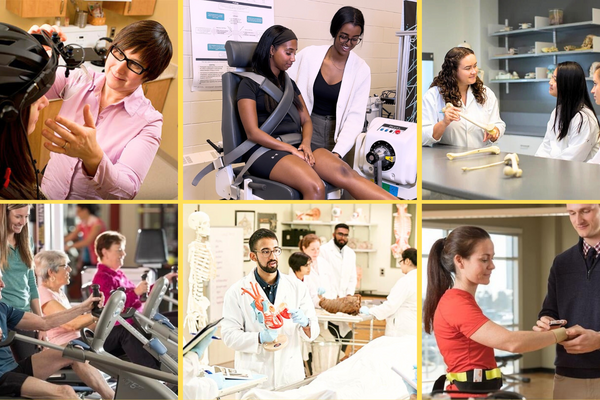
Practicing close to home
Pharmacy graduate explores his passion while returning to his hometown roots

Pharmacy graduate explores his passion while returning to his hometown roots
By Vanessa Parks Faculty of ScienceJeremy Lee, a recent graduate of the Doctor of Pharmacy program at Waterloo, found his passion while working for a community pharmacy in his hometown of North Bay. After completing an undergraduate degree in biomedical science at the University of Ottawa, he returned home to support his family and gain work experience but ended up discovering his career path in the process.
Lee was exposed to pharmacy early in life. “My grandmother was a pharmacist, and she got me interested in how medications affect the body,” he says. “When I got the chance to work in a pharmacy, I quickly realized how much I loved it and applied to the School of Pharmacy at the University of Waterloo.”
Lee was drawn to Waterloo because of the strength of the co-op program and the flexibility it provided. “Co-op worked really well for me, especially because I could self-arrange my placements,” he says. “I did all my co-ops at Northern Shores Pharmacy, the place where I discovered my love of pharmacy. It was nice to be able to work and support my family while being home with them in North Bay.”
 This was particularly important for Lee, because he and his partner expanded their family during his time at Waterloo Pharmacy. His son was born during his second year, and he welcomed a daughter while completing his fourth-year patient care rotations.
This was particularly important for Lee, because he and his partner expanded their family during his time at Waterloo Pharmacy. His son was born during his second year, and he welcomed a daughter while completing his fourth-year patient care rotations.
Being home in North Bay with his growing family was important to Lee, but that wasn’t the only thing he loved about his experiential placements. “Returning to North Shores, I was able to build a rapport with patients. I would see familiar faces and apply what I had learned in my program to help people reach their healthcare goals.”
His education at Waterloo prepared Lee well for changes in his field that took place while he was completing his degree. “Pharmacists prescribing for minor ailments was a new scope proposed while I was working on my degree and has now launched in Ontario,” he explains. “We were trained at the same time as this scope expanded. I got a solid education at a critical time in the field and my co-op terms gave me the chance to apply my learning. This was a valuable part of my experience at Waterloo Pharmacy.”
Lee is now working at the hospital in North Bay, which is not where he initially thought he would end up. “In my fourth year, I did a hospital rotation and immediately fell in love with the interprofessional collaboration, new types of interventions and different ways of helping patients,” Lee says. “One of the main reasons I went into pharmacy was to be a lifelong learner, and my job now is helping me learn new practices and build relationships with other healthcare practitioners.”
As a piece of advice for students interested in pharmacy, Lee shares, “If pharmacy isn’t something you’ve done before, it’s a good idea to reach out to a community pharmacy and see if there are volunteer or job opportunities. You have a much better understanding of the environment once you’re in it.”
And once you’re here? “Be open to change,” he says. “Throughout my degree, I learned a lot and practiced in very different settings. I thought I wanted to go into community pharmacy, but I’m working in a hospital now, and I love it. Come into the program open to having your mind changed based on your experiences and what you learn here and go with it.”
Interested in pursing a pharmacy degree? Learn more about Canada’s only co-op Doctor of Pharmacy program.

Read more
From optometry and pharmacy to public health and therapeutics, Waterloo alumni are powering Canada’s health care sector

Read more
Here are the people and events behind some of this year’s most compelling Waterloo stories

Read more
Through gifts to the Waterloo Eye Institute, donors are helping to prepare the next generation of eye and vision care providers
The University of Waterloo acknowledges that much of our work takes place on the traditional territory of the Neutral, Anishinaabeg, and Haudenosaunee peoples. Our main campus is situated on the Haldimand Tract, the land granted to the Six Nations that includes six miles on each side of the Grand River. Our active work toward reconciliation takes place across our campuses through research, learning, teaching, and community building, and is co-ordinated within the Office of Indigenous Relations.